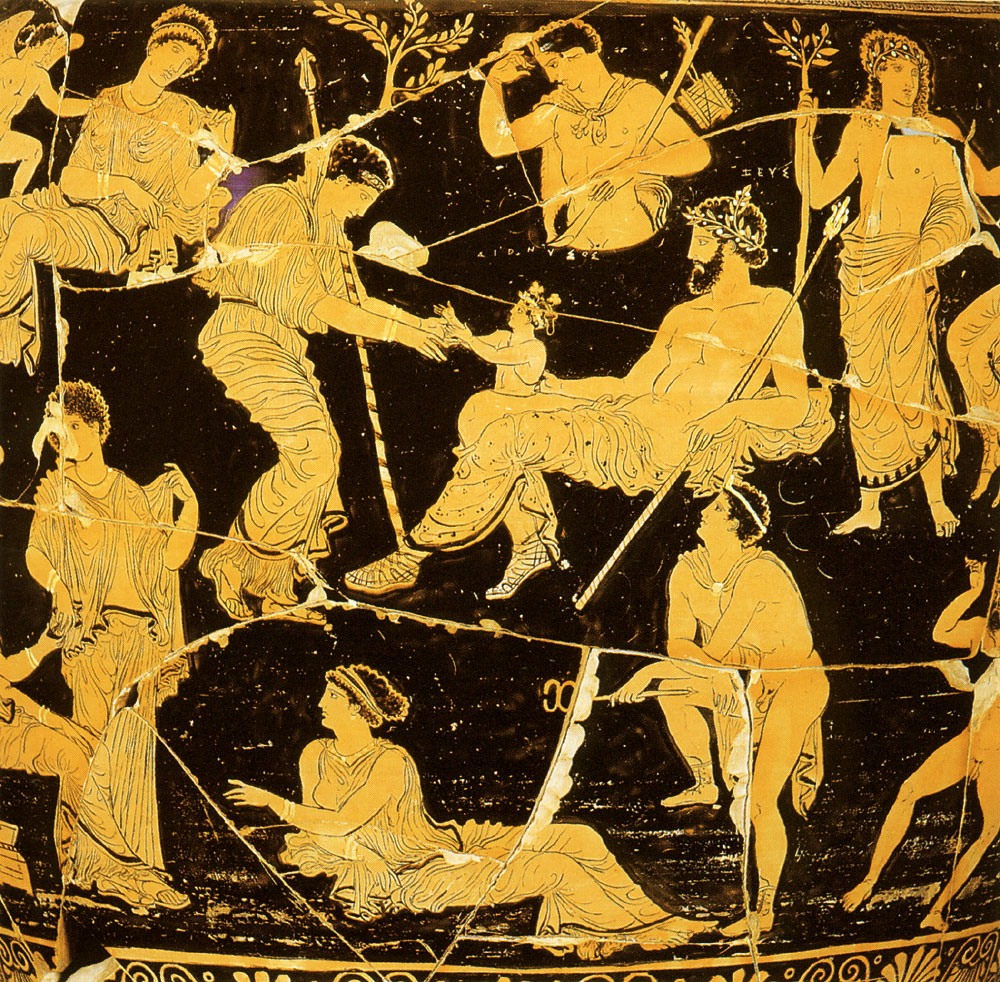Parties with drinking, dancing, and singing are rarely thought of as cults. Cults are often thought of as small religious groups that are frowned upon and viewed with suspicion by outsiders. Today, when we hear the word cult, we imagine people wearing white robes, creepy leaders and brainwashed followers who follow their leaders into rituals of mass suicide by Kool-Aid. In ancient Greece, however, everyone wanted to be a part of the Cult of Dionysus, where everyone would gather with free food, free wine, and the Goat Song.
Dionysus is the Greek God of wine, of winemaking, and of merriment and gaiety. He was supposed to have been born by the union of a mortal woman, Semele, princess of Thebes, and the greatest of the Greek gods, Zeus. Ancient Greek mythology holds that he was twice born, because when Semele was pregnant with Dionysus, Zeus took him and kept him in his thigh until he was ready to be born. While this may sound strange, there is a good explanation. Hera, Zeus’ wife who was also a goddess, had learned that Zeus had impregnated a moral woman; she was filled with jealousy and rage. The vengeful Hera disguised herself as a mortal woman and visited Semele. Once with her, she convinced Semele to ask Zeus to grant her one wish. When Semele asked for her one wish, Zeus promised to grant her anything. Semele asked Zeus to present himself in his true form, as a god not as a man, as suggested by Hera. Zeus kept his promise, but he knew that if Semele ever gazed upon him, she would die. So when he revealed himself to Semele in his true form, Zeus had Hermes take Dionysus from her womb and placed him into Zeus’ thigh so that he would not also die with Semele.1

As the god of wine, Dionysus is supposed to spread the knowledge of how to grow grape vines. In ancient Greece, wine was one of the few goods they could produce. Because of this, Dionysus was a major deity, and it was said that he was one of the twelve gods that lived upon Mount Olympus. Temples were erected in his honor and worship of him spread throughout the Greek poleis. Annual festivals called Dionysia were held in his honor and, of course, the purpose was to relax, feast, dance, and drink wine.2

Some dances in honor of Dionysus were performed on oiled wineskins, which were bags made out of animal skins that were filled with wine. Dionysus loved goats, donkeys, and tigers. Not only were those animals at the Dionysia, but their skins were also danced upon. When someone fell off the oiled wineskins, everyone cheered, laughed, and drank wine.
The Greeks held competitions to see who might be the manliest man and who could drink a pitcher of wine the fastest. The winner would receive a smaller oiled wineskin as a trophy, which was essentially another container of wine.3

At the annual Dionysia, the Goat Song was also preformed. The Goat Song gave birth to Greek drama. Originally, a song or hymn was sung as a goat was being sacrificed to Dionysus. The song often addressed questions that were arising about divine law, judgement, and various social conflicts of general concern. The Goat Song was seen as something of a group discussion or address of common concerns, and as a way for people collectively and individually to purify their minds. The hymn then became a performance piece, sung by a chorus. The performance evolved over time to include first a monologue, and then with the addition of a second voice, a dialogue. Eventually, more voices were added, and the performance of the Goat Song became the tragic drama we have come to associate with the great Greek tragedians Aeschylus, Sophocles, and Euripides. In fact, the Greek word tragedia, from which we get our word tragedy, literally translates as “the song of a male goat.” The Greeks truly loved drama because they felt that the gods were speaking to them and judging their piety, rather than merely being annoyed by them.4
The cult of Dionysus does not seem so suspicious now. There were not any outrageous daily rituals or strange articles of clothing they had to wear. The cult of Dionysus consisted of dancing, drinking, singing, and feasting, every college student’s four favorite things.
- Salem Press Encyclopedia, January 2016, s.v. “Dionysus,” by Rebecca K. Rector. ↵
- Eleni Pachoumi, “Dionysus in the Greek Magical Papyri,” Symboae Osloenses 88, no. 1, (2014): 129. ↵
- Alana Koontz, “The Art and Artifacts Associated with the Cult of Dionysus,” (Masters Thesis, University of Wisconsin-Milwaukee, 2013), 4. ↵
- Britt-Mari Näsström, “The rites in the mysteries of Dionysus: the birth of the drama,” Åbo Akademi: Open Journal Systems. (2014): BASE, EBSCOhost. ↵



77 comments
Antoinette Johnson
The cult of Dionysus sounds really interesting, it really reminds me of a party of today with a twist of Greek tradition. With the word cult in front, I assumed it was a suspicious and dangerous religious group. It is just a party of festival people go to have fun and celebrate with each other. This cult of Dionysus is another way for people to get together and celebrate different topics mostly relating to Dionysus using what he is known for wine and goat.
Esperanza Rojas
When I decided to read this article, I was expecting a Greek cut that sacrificed the Persians or something but it wasn’t. I really enjoyed it because it had such an interesting story attached to the cult. The author was right in the sense that this cut isn’t like any other and seems extremely fun and nice to be part of. What really caught me off guard was when it was explaining that Zeus put his son inside his thigh, that was really entertaining to read and added some interest to the story.
Clarissa Gonzalez
Seeing this title I expected something more, culty maybe? The actual article totally threw me off when talking about what Dionysus’ cult really was. The beginning when just speaking about his orgins and how they mostly just got drunk and partied didn’t match what I thought a cult was, but once it stated that they had orgies and killed every now and then, I was like oh there it is.
Eric Ortega Rodriguez
Reading this article, I did not know what to expect. As many, I viewed cults negatively and would have never expected that in the Cult of Dionysus, there would be such wild parties. I found it surprising how there is a god of wine. I would have never expected that. This article was very informative, it is interesting to see how there were manly competitions in Greek mythology and that the idea of being on top has not changed. It was also interesting to see how much more intense the Greek parties were those of the modern day.
Vanessa Tombo
From the title to the first paragraph I was extremely engrossed in reading this article. I just wanted to know everything and anything about the “Cult of Dionysus”. This article was very educational and the manner in which it was written made this article very easy to follow. “Dancing, drinking, singing, and feasting, every college student’s four favorite things.” not very true.
Christopher King
I liked that the origins of Dionysius and how he became a God. I had known quite a bit about the parties and the Cult of Dionysius. There were a lot of drunken parties that would probably put many of the frat parties experienced now today. One of the things that is not, or at least I hope not, like college parties is that they would have massive orgies and every once in a while kill someone for entertainiment. These parties were wild and much more than just a get together to drink wine.
Robert Rodriguez
I’ve never heard of such a cult that just gets drunk and parties, this is unlike any other cult I’ve ever heard before. It made me wonder if they praised the God of Wine as an excuse to do nothing but get drunk ahahaha. I used to be really interested in greek mythology but was never aware of a cult that praises the god of wine, that was surprising to me. This was a very informative article and it definitely shed a light on something that was probably unknown to most people.
Elias Garza
Greek mythology always intrigues me. With that being said, reading these articles are always easy to follow all the way through. First off, I find it odd that Dionysus was born twice and I find it even more strange that he was kept in Zeus thigh. This culture, the cult, does not bring any suspicion to me, in fact it grasped my attention more so than other cultures do.
Joshua Castro
I have heard of Dionysus prior to reading this article, but I was not aware that he was worshipped as such. I had always thought the we was considered a minor Greek god. I also did not know that we was born from Zeus’s thigh! I find it weird to learn about a cult that revolves around feasting, dancing, drinking, and singing rather than one that is trying to achieve a higher level in life. This was really intriguing and a fun read as well!
Fumei P.
I just finished commenting on the heaven’s gate article, a cult that believed that in order to reach a higher level of being (In which you were an alien) you have to shed your human body, and a spaceship picks you up to go to heaven’s gate. Let’s just say that the Heaven’s gate cult didn’t turn out so well. The Cult of Dionysus seems to have a much better outlook, and no real negative consequences besides some liver damage from drinking wine, achy legs from dancing all night, and maybe the occasional animal sacrifice. The story of how Dinoysus was born out of Zeus’s’ thigh was also interesting.